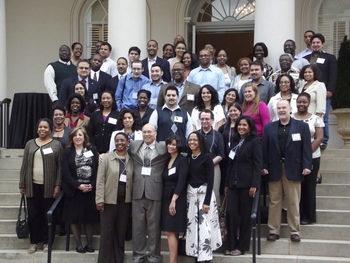
In response to both a critical need for technological innovation and for ways to address the disturbing shortage of minority engineering faculty across the country, the National Science Foundation has funded Biomedical Engineering Professor and Associate Chair of Graduate Studies Gilda Barabino in the creation of a workshop to encourage some of America’s leading engineering faculty members in the area of research innovation. The Minority Faculty Development Workshop (MFDW): Engineering Enterprise and Innovation was held at Georgia Tech March 15 – 18, 2012 and attracted engineering faculty and innovators from Harvard, Stanford, North Carolina A+T and over 40 other outstanding institutions. After a rigorous selection process, more than 70 engineering researchers attended and gained essential insight, resources and knowledge toward activities that support innovation, entrepreneurial endeavors and ultimately, the economic status of our nation.
As an internationally recognized researcher and educator, and the newly elected president of the Biomedical Engineering Society, Dr. Gilda Barabino has committed herself to her technical career and to impacting the future by developing opportunities for innovation and career success among minority faculty. Dr. Barabino summarized the impact of her vision for this event by saying: “By providing opportunities for professional development linked to a better understanding of research innovation and translation, the MFDW contributes to the development and retention of a well equipped faculty cadre and broadens the talent pool for translational research that drives company formation, job creation, a healthy economy, and global competitiveness.”
The criticality of her vision is of national importance, as demonstrated by national support for the MFDW meeting. The Dean of Engineering at Georgia Tech, Dr. Gary May, was one conference sponsor who recognizes the significance of this event. Dean May stated: “Faculty are the intellectual life blood of universities, so faculty development is a critical issue. This is particularly true for underrepresented faculty in STEM fields, as there are too few of us to allow any to be unsuccessful. I applaud the Minority Faculty Development Workshop for seeking solutions which will contribute to successful, enriched, and fulfilling careers for its participants.”
